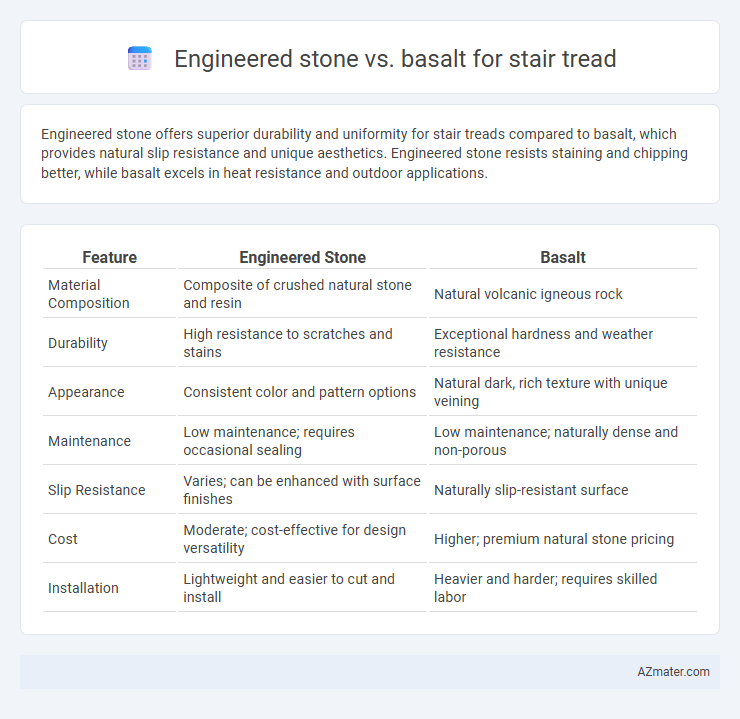Engineered stone offers superior durability and uniformity for stair treads compared to basalt, which provides natural slip resistance and unique aesthetics. Engineered stone resists staining and chipping better, while basalt excels in heat resistance and outdoor applications.
Table of Comparison
| Feature | Engineered Stone | Basalt |
|---|---|---|
| Material Composition | Composite of crushed natural stone and resin | Natural volcanic igneous rock |
| Durability | High resistance to scratches and stains | Exceptional hardness and weather resistance |
| Appearance | Consistent color and pattern options | Natural dark, rich texture with unique veining |
| Maintenance | Low maintenance; requires occasional sealing | Low maintenance; naturally dense and non-porous |
| Slip Resistance | Varies; can be enhanced with surface finishes | Naturally slip-resistant surface |
| Cost | Moderate; cost-effective for design versatility | Higher; premium natural stone pricing |
| Installation | Lightweight and easier to cut and install | Heavier and harder; requires skilled labor |
Introduction to Engineered Stone and Basalt Stair Treads
Engineered stone stair treads are composed of crushed quartz mixed with resin, offering high durability, non-porous surfaces, and a wide range of customizable designs ideal for modern staircases. Basalt stair treads, made from natural volcanic rock, provide exceptional hardness, heat resistance, and a distinctive dark appearance valued in both residential and commercial applications. Both materials excel in strength and aesthetics, but engineered stone allows for greater design flexibility, while basalt emphasizes natural texture and longevity.
Material Composition and Manufacturing Processes
Engineered stone consists primarily of crushed natural quartz combined with resin and pigments, offering high durability and uniformity due to its controlled manufacturing process involving compression and curing. Basalt, a natural volcanic rock, is quarried and then cut and polished without additives, retaining its inherent strength and unique mineral patterns. The engineered stone's resin binders provide enhanced stain and impact resistance, whereas basalt's natural composition results in superior heat resistance and a distinct, textured appearance ideal for stair treads.
Durability and Strength Comparison
Engineered stone stair treads offer exceptional durability with high resistance to scratches, stains, and impact, making them well-suited for heavy foot traffic. Basalt, a natural volcanic rock, provides superior compressive strength and excellent wear resistance, ensuring long-lasting performance under substantial loads. While engineered stone has enhanced non-porous properties, basalt's inherent toughness and thermal stability contribute to its robustness in both indoor and outdoor stair applications.
Aesthetic Variety and Design Flexibility
Engineered stone offers a wide range of colors, patterns, and finishes, providing exceptional aesthetic variety for stair treads. Basalt, while limited in color options, delivers a natural, sleek appearance with consistent texture and durability. Design flexibility is higher with engineered stone due to its customizable shapes and sizes, whereas basalt requires more precise cutting techniques but enhances spaces with its organic elegance.
Slip Resistance and Surface Safety
Engineered stone offers moderate slip resistance due to its polished surface, requiring additional treatments or finishes to enhance safety for stair treads. Basalt, a natural volcanic rock, inherently provides superior slip resistance with its textured surface, minimizing slip hazards in high-traffic areas. The choice between engineered stone and basalt for stair treads significantly impacts surface safety, with basalt generally preferred for its natural grip and durability under wet or oily conditions.
Maintenance Requirements and Longevity
Engineered stone offers low maintenance with high resistance to stains and scratches, making it ideal for stair treads in high-traffic areas. Basalt, a natural volcanic rock, is highly durable and weather-resistant but requires periodic sealing to prevent moisture absorption and maintain its appearance. Both materials provide excellent longevity, with basalt typically lasting longer in outdoor settings due to its inherent toughness and natural composition.
Cost Analysis and Budget Considerations
Engineered stone stair treads typically cost between $50 to $150 per square foot, offering a variety of finishes at mid-range prices, whereas basalt ranges from $70 to $120 per square foot, often providing superior durability and natural aesthetics. Budget considerations should include installation expenses, as engineered stone generally requires less specialized labor compared to the heavier and denser basalt, which can increase handling and fitting costs. Long-term maintenance and potential repairs also influence total cost, with engineered stone demanding more frequent upkeep but lower initial outlay compared to the resilient, but pricier, basalt alternative.
Environmental Impact and Sustainability
Engineered stone stair treads typically contain a high percentage of recycled materials and offer durability that extends product lifespan, reducing the need for frequent replacements and lessening environmental impact. Basalt, a natural volcanic rock, is abundant and requires minimal processing, resulting in lower embodied energy and reduced carbon emissions during extraction and manufacturing. Both materials contribute to sustainability, with engineered stone emphasizing recycled content and basalt benefiting from its natural availability and minimal chemical treatments.
Installation Process and Challenges
Engineered stone stair treads offer a streamlined installation process due to their uniform composition and precise factory fabrication, which reduces the need for on-site adjustments. Basalt, being a natural stone, requires skilled cutting and shaping to accommodate its variable density and natural imperfections, posing challenges such as increased labor time and the need for specialized tools. Both materials demand proper anchoring and leveling to ensure safety and durability, but basalt's porous nature may necessitate additional sealing and maintenance steps during installation.
Suitability for Indoor and Outdoor Applications
Engineered stone offers excellent durability and stain resistance, making it highly suitable for indoor stair treads where aesthetics and maintenance are priorities. Basalt, known for its natural strength and weather resistance, excels in outdoor applications by withstanding harsh environmental conditions and providing a slip-resistant surface. Both materials differ in porosity and thermal expansion, influencing their long-term performance in varying indoor and outdoor settings.

Infographic: Engineered stone vs Basalt for Stair tread
 azmater.com
azmater.com